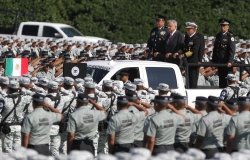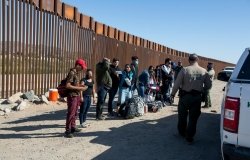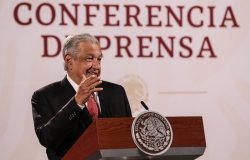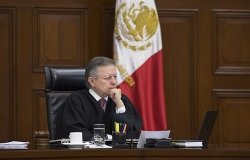U.S.-Mexico Security Cooperation Pillar IV: Building Strong and Resilient Border Communities
The conference, U.S.-Mexico Security Cooperation Pillar IV: Building Strong and Resilient Border Communities, examined underlying issues,such as chronic underemployment and rising domestic drug consumption, that fuel organized crime in Mexico and brought together key border-region stakeholders to discuss the implementation of new government policies aimed at addressing the root causes of organized crime proliferation.
Overview
Underlying structural factors—chronic underemployment, rising drug consumption, and dysfunctional governance—have made some Mexican cities along the border susceptible to organized crime infiltration, fueling the cartel violence that has led to thousands of deaths this decade. To build resilience against this threat, the U.S. and Mexican governments have designed social programming policies to address root causes, through efforts to prevent youth violence and gangs, engage the private sector to boost jobs, and reactivate local civil society. Grouped under the label Pillar IV, the policies are part of the Beyond Merida security cooperation agenda that includes the dismantling of drug cartels, the reforming of Mexican police and courts, and the modernization of infrastructure and procedures along the U.S.-Mexico border.
Yet Pillar IV has major challenges. Benchmarking and properly measuring outcomes is one difficulty, while ensuring policy continuity across administrations for what are necessarily long-term projects is another. In either country, funding is a perennial concern subject to competing priorities and short-term politics in any given fiscal year.
The conference, U.S.-Mexico Security Cooperation Pillar IV: Building Strong and Resilient Border Communities, examined these issues and invited the participation of Mexican and U.S. officials tasked with overseeing policy, as well as that of border-region stakeholders involved in implementation from Ciudad Juarez-El Paso-Las Cruces and San Diego-Tijuana.
In spite of the challenges, panelists stressed that the process of Pillar IV implementation has yielded benefits. It has created opportunities for engagement between government and civil society in Mexico, and it has enabled a finer and more localized diagnosis of the problem of crime, moving away from less-than-effective "whole city" approaches. Broadly, it has allowed average citizens to have more of a voice and stake in the development of policy interventions, said Adriana Obregón Andria Vázquez, Assistant Director General for Social Policy, Office of the Presidency, Mexico. "Government actions are not enough without community support," she said Adriana Obregon. Said Denise Moreno Ducheny, former state Senator, California, "Violence impacts everyone who lives in a bi-national metropolitan region."
Edgar Ruiz, deputy director, Council of State Governments-West, put forward the Border Legislative Conference, partly funded through the U.S. Agency for International Development (USAID), as a good model for bi-national collaboration on cross-border policy issues, such as shared environmental concerns. Lucinda Vargas, executive board member, Plan Estrategico de Juárez, stressed the need to redraft the social contract in Ciudad Juárez, opposite El Paso, TX, so that average citizens feel empowered and can hold elected representatives accountable. Carlo Arze, program director, International Youth Foundation, stressed a need to "change paradigms" regarding the problem of youth violence, from enforcement to conflict-resolution. "We need to create a community of peace builders in a city of violence," he said.
Pillar IV efforts combine with ongoing USAID and Bureau of International Narcotics Law Enforcement programs to enhance the rule of law and culture of lawfulness in Mexico, respectively, said Kermit Moh, acting deputy assistant administrator, Bureau for Latin America and the Caribbean, USAID, and Susan Snyder, Coordinator for Mexico and Central America, Bureau of International Narcotics Law Enforcement, Department of State.
For more information contact Miguel Salazar, Woodrow Wilson Center Mexico Institute program assistant at miguel.salazar@wilsoncenter.org.
Documents & Downloads
- U.S.-Mexico Security Cooperation Pillar IV: Building Strong and Resilient Border CommunitiesDownload
- U.S.-Mexico Security Cooperation Pillar IV: Building Strong and Resilient Border CommunitiesDownload
- U.S.-Mexico Security Cooperation Pillar IV: Building Strong and Resilient Border CommunitiesDownload
- U.S.-Mexico Security Cooperation Pillar IV: Building Strong and Resilient Border CommunitiesDownload
- U.S.-Mexico Security Cooperation Pillar IV: Building Strong and Resilient Border CommunitiesDownload
- U.S.-Mexico Security Cooperation Pillar IV: Building Strong and Resilient Border CommunitiesDownload
Speakers

Eric L. Olson
Director of Policy and Strategic Initiatives, Seattle International Foundation
Adriana Obregón Andria Vázquez
Office of the Presidency, Mexico
Kermit Moh
Susan Snyder

Diana Villiers Negroponte
Denise Moreno
California
Carlo Arze
International Youth Foundation
Lucinda Vargas
Plan Estrategico de Juárez
Edgar Ruiz
Enrique Betancourt
Hosted By

Mexico Institute
The Mexico Institute seeks to improve understanding, communication, and cooperation between Mexico and the United States by promoting original research, encouraging public discussion, and proposing policy options for enhancing the bilateral relationship. A binational Advisory Board, chaired by Luis Téllez and Earl Anthony Wayne, oversees the work of the Mexico Institute. Read more
Thank you for your interest in this event. Please send any feedback or questions to our Events staff.









